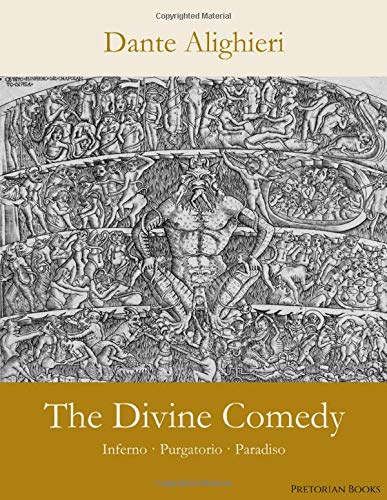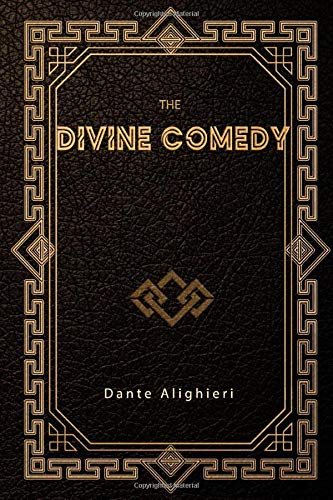-
The Divine Comedy
Dante Alighieri, John Ciardi
Paperback (Berkley, May 27, 2003)The authoritative translations of The Inferno, The Purgatorio, and The Paradiso—together in one volume.Belonging in the immortal company of the great works of literature, Dante Alighieri’s poetic masterpiece, The Divine Comedy, is a moving human drama, an unforgettable visionary journey through the infinite torment of Hell, up the arduous slopes of Purgatory, and on to the glorious realm of Paradise—the sphere of universal harmony and eternal salvation.Now, for the first time, John Ciardi’s brilliant and authoritative translations of Dante’s three soaring canticles—The Inferno, The Purgatorio, and The Paradiso—have been gathered together in a single volume. Crystallizing the power and beauty inherent in the great poet’s immortal conception of the aspiring soul, The Divine Comedy is a dazzling work of sublime truth and mystical intensity.
-
The Divine Comedy - Inferno
Dante Alighieri, Denis G. Daly, Spoken Realms
Audiobook (Spoken Realms, Dec. 29, 2013)Among the monuments of world literature, few works have been as influential as the Divine Comedy. Dante's compendious allegory of a journey through the world of the afterlife is significant on many levels. It established Italian as a literary language, and consolidated the position of Florentine Italian as the lingua franca of the Italian peninsula. As an engaging portrait of the social and intellectual life in medieval Florence it is unrivalled. Above all, it is a narrative poem of great power, and the richness of Dante's imagery and his vivid and concise descriptions of characters and events, gives the work a compelling immediacy which has not diminished over the centuries. There are many English translations of the Divine Comedy, which vary in both quality of versification and fidelity to the original. The translation by Ichabod Charles Wright is notable for its accuracy and a self-effacing elegance of verbiage. With the translation Wright has also included some explanatory essays, which are very helpful to readers and listeners who are unfamiliar with Dante and his world. Each canto of the poem is also headed with a concise synopsis. The first volume, The Inferno, describes Dante's journey through the underworld, where unrepentent sinners are subjected to eternal punishment, the form of which is dictated by their besetting sin. Unsurprisingly, Dante's haunting vision of Hell has always had greater hold on the public imagination than have his bracing journey through Purgatory or his sojourn among the eclectic delights of Paradise.
-
The Divine Comedy: Volume 1: Inferno
Dante Alighieri, Mark Musa
Paperback (Penguin Classics, Dec. 31, 2002)An acclaimed translation of Dante Alighieri's The Divine Comedy Volume 1: Inferno that retains all the style, power and meaning of the originalA Penguin Classic This vigorous translation of Inferno preserves Dante's simple, natural style, and captures the swift movement of the original Italian verse. Mark Musa's blank verse rendition of the poet's journey through the circles of hell recreates for the modern reader the rich meanings that Dante's poem had for his contemporaries. Musa's introduction and commentaries on each of the cantos brilliantly illuminate the text. For more than seventy years, Penguin has been the leading publisher of classic literature in the English-speaking world. With more than 1,700 titles, Penguin Classics represents a global bookshelf of the best works throughout history and across genres and disciplines. Readers trust the series to provide authoritative texts enhanced by introductions and notes by distinguished scholars and contemporary authors, as well as up-to-date translations by award-winning translators.
-
The Divine Comedy: Inferno; Purgatorio; Paradiso
Dante Alighieri, Allen Mandelbaum
Hardcover (Everyman's Library, Aug. 1, 1995)This Everyman’s Library edition–containing in one volume all three cantos, Inferno, Purgatorio, and Paradiso–includes an introduction by Nobel Prize—winning poet Eugenio Montale, a chronology, notes, and a bibliography. Also included are forty-two drawings selected from Botticelli's marvelous late-fifteenth-century series of illustrations.Translated in this edition by Allen Mandelbaum, The Divine Comedy begins in a shadowed forest on Good Friday in the year 1300. It proceeds on a journey that, in its intense recreation of the depths and the heights of human experience, has become the key with which Western civilization has sought to unlock the mystery of its own identity. Mandelbaum’s astonishingly Dantean translation, which captures so much of the life of the original, renders whole for us the masterpiece of that genius whom our greatest poets have recognized as a central model for all poets.
-
The Divine Comedy: Inferno; Purgatorio; Paradiso
Dante Alighieri
Paperback (Pretorian Books, Nov. 15, 2019)Dante Alighieri - The Divine Comedy: Inferno; Purgatorio; ParadisoIn Dante Alighieris world famous classic The Divine Comedy the roman poet Vergil guides through Inferno and Purgatorio and ultimately it’s his childhood friend Beatrice who guides through Paradise.The journey describes the symbolic path to God on a deeper level, while the reader is meeting the soules of countless decedents‘ like Horaz, Barbarossa and Ovid.Dante Alighieri and his epic drama The Divine Comedy helped the italian to it's breakthrough as literary language.
-
The Divine Comedy: Volume 1: Inferno
Dante Alighieri, Robin Kirkpatrick, Coralie Bickford-Smith
Hardcover (Penguin Classics, Sept. 28, 2010)Part of Penguin's beautiful hardback Clothbound Classics series, designed by the award-winning Coralie Bickford-Smith, these delectable and collectible editions are bound in high-quality colourful, tactile cloth with foil stamped into the design. Describing Dante's descent into Hell midway through his life with Virgil as a guide, Inferno depicts a cruel underworld in which desperate figures are condemned to eternal damnation for committing one or more of seven deadly sins. As he descends through nine concentric circles of increasingly agonising torture, Dante encounters doomed souls including the pagan Aeneas, the liar Odysseus, the suicide Cleopatra, and his own political enemies, damned for their deceit. Led by leering demons, the poet must ultimately journey with Virgil to the deepest level of all. For it is only by encountering Satan, in the heart of Hell, that he can truly understand the tragedy of sin.
-
The Divine Comedy
Dante Alighieri, Gustave Dore
Leather Bound (Canterbury Classics, Nov. 12, 2013)“O human race, born to fly upward, wherefore at a little wind dost thou so fall?”Inferno, Purgatorio, and Paradiso--the three fates of the deceased become the three pillars of an epic poem. The Divine Comedy, written by Italian poet Dante Alighieri in the fourteenth century, is considered the foremost work in Italian literature. The journey begins with Dante’s descent into the depths of Hell where he witnesses those eternally separated from God. Then he climbs the mountain of Purgatory where Christian souls undergo final purification, before finally touring the celestial circles of Heaven where he is filled with the image of God. An allegorical work, the comedy is representative of the soul’s journey towards God. Influential for seven centuries, this classic is a must have for lovers of great literature, and the luxurious leather-bound edition from Canterbury Classics will make a stunning addition to any library.
-
The Divine Comedy
Dante Alighieri
eBook (, Aug. 5, 2020)Midway upon the journey of our lifeI found myself within a forest dark,For the straight-forward pathway had been lost.Ah me! how hard a thing it is to sayWhat was this forest savage, rough, and stern, Which in the very thought renews the fear.So bitter is it, death is little more;But of the good to treat, which there I found,Speak will I of the other things I saw there.I cannot well repeat how there I entered,So full was I of slumber at the momentIn which I had abandoned the true way.But after I had reached a mountain's foot,At that point where the valley terminated, Which had with consternation pierced my heart,Upward I looked, and I beheld its shoulders,Vested already with that planet's raysWhich leadeth others right by every road.Then was the fear a little quietedThat in my heart's lake had endured throughoutThe night, which I had passed so piteously.And even as he, who, with distressful breath,Forth issued from the sea upon the shore,Turns to the water perilous and gazes;So did my soul, that still was fleeing onward.....
-
The Divine Comedy
Dante Alighieri
Paperback (Independently published, June 30, 2019)Written in the 14th century by Italian writer Dante Alighieri, The Divine Comedy chronicles Dante's fictional journey through Hell, Purgatory, and Heaven. Profoundly allegorical, it has challenged and inspired generations of readers.
-
The Divine Comedy
Dante Alighieri
Paperback (Independently published, March 17, 2020)Dante Alighieri – Die göttliche KomödieinklusiveDantes InfernoPurgatorioParadisoIn seinem Klassiker der Weltliteratur lässt Dante Alighieri zuerst den römischen Dichter Vergil durch Hölle und Fegefeuer führen und zuletzt seine Jugendfreundin Beatrice durch das Paradies.Mit dieser Reise möchte der Autor auf tieferer Ebene den symbolischen Weg zu Gott beschreiben, wobei dem Leser dabei die Seelen unzähliger Verstorbener begegnen, unter anderem lässt der Autor Horaz, Barbarossa und Ovid sprechen.Dante Alighieri verhalf mit seinem Epos Die göttliche Komödie der italienischen Sprache zum Durchbruch als Literatursprache.Dante Alighieri - The Divine Comedy: Inferno; Purgatorio; ParadisoIn Dante Alighieris world famous classic The Divine Comedy the roman poet Vergil guides through Inferno and Purgatorio and ultimately it’s his childhood friend Beatrice who guides through Paradise.The journey describes the symbolic path to God on a deeper level, while the reader is meeting the soules of countless decedents‘ like Horaz, Barbarossa and Ovid.Dante Alighieri and his epic drama The Divine Comedy helped the italian to it's breakthrough as literary language.
-
The Divine Comedy
Dante Alighieri, Henry Francis Cary
Paperback (Independently published, Dec. 9, 2019)The Divine Comedy is a long Italian narrative poem by Dante Alighieri, begun c. 1308 and completed in 1320, a year before his death in 1321. It is widely considered to be the pre-eminent work in Italian literature and one of the greatest works of world literature.
-
The Divine Comedy: Inferno, Purgatorio, Paradiso
Dante Alighieri
Hardcover (Prince Classics, May 24, 2019)The Divine Comedy is an Italian long narrative poem by Dante Alighieri, begun c. 1308 and completed in 1320, a year before his death in 1321. It is widely considered to be the preeminent work in Italian literature and one of the greatest works of world literature. The poem's imaginative vision of the afterlife is representative of the medieval world-view as it had developed in the Western Church by the 14th century. It helped establish the Tuscan language, in which it is written (also in most present-day Italian-market editions), as the standardized Italian language. It is divided into three parts: Inferno, Purgatorio, and Paradiso.The narrative describes Dante's travels through Hell, Purgatory, and Paradise or Heaven, while allegorically the poem represents the soul's journey towards God. Dante draws on medieval Christian theology and philosophy, especially Thomistic philosophy derived from the Summa Theologica of Thomas Aquinas. Consequently, the Divine Comedy has been called "the Summa in verse". In Dante's work, Virgil is presented as human reason and Beatrice is presented as divine knowledge.